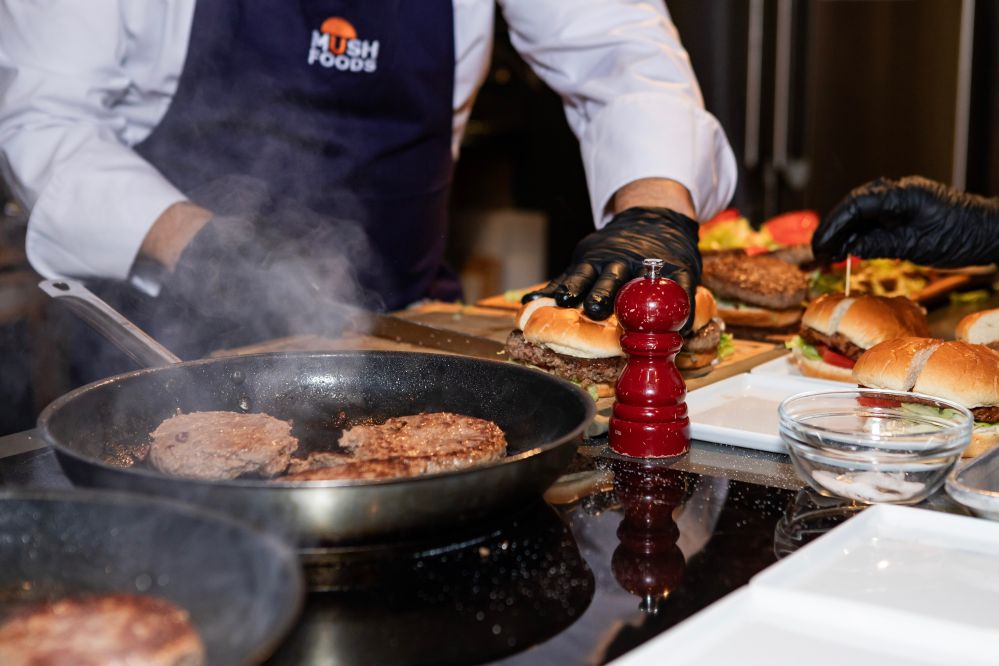Mush Foods is launching its 50CUT mycelium (mushroom root) blends in the US market to foodservice customers following a successful launch of its b2b ‘meat-plus’ concept in Israel.
“Today we are announcing commercial availability in the US,” cofounder and CEO Shalom Daniel told AgFunderNews. “We will announce our first US customer in the coming weeks and will start distribution in the coming days. Contracts are being finalized and we look forward to sharing news about US customers very soon.”
Unlike Meati, Quorn, and ENOUGH Foods, which use fungi strains fed on sugar grown via submerged fermentation in large steel bioreactors, Mush Foods is taking an asset-light b2b approach, growing edible mushroom strains via a solid-state fermentation process, partnering with indoor farmers that grow its mushroom mycelium and then selling it to meat processors or foodservice companies to combine with ground meat, said Daniel. “Our process is modern agriculture, so the capex needed is much lower.”
While its growing process is similar to that deployed by My Forest Foods, Mush Foods is using upcycled food and agricultural waste as a substrate and is not spending money building a consumer brand. Its initial focus is on colleges and other institutions under pressure to reduce their environmental footprint, said Daniel.
“What’s the benefit in eating [100%] plant-based meat alternatives today? Are they tastier than meat? No. Are they cheaper than meat? No. With our blended approach, we’re enabling companies to reduce the carbon footprint of their meat products while improving their nutrition (cutting saturated fat and cholesterol and adding fiber, potassium, iron, and calcium) without spending more money, and retaining the flavor and mouthfeel of traditional meat.”
He added: “Many dining operations have targets to reduce their carbon footprint, but they can’t get close to the target by bringing in vegan and vegetarian solutions, because right now, they’re only relevant for small percentage of diners. We’re enabling them to meet or exceed their targets with healthier products that all diners will eat.”
“There are several challenges that are holding back the wide adoption of foods which are 100% plant-based, keeping its market share at unsatisfying levels. Mush Foods solution tackles these challenges and has the potential of widespread adoption. Having a million people cutting their meat consumption by 50% is a lot more likely to make an impact than one hundred thousand giving up on meat altogether.” Amir Zaidman, chief business officer, The Kitchen FoodTech Hub
Asset-light approach
Founded in 2021 by former Unilever executive Shalom Daniel, Dr. Idan Pereman (a molecular biologist specializing in edible mushroom cultivation), and Dr. Dan Levanon (a 30-year veteran in fungi research), Mush Foods has been ramping up its US operation over the past year, forming partnerships with indoor farmers in the Hudson Valley that grow its mycelium in trays in eight days using a solid-state fermentation process and setting up a processing facility at the Rutgers Innovation Center in Bridgeton, New Jersey.
The asset-light approach is critical to Mush Foods’ philosophy, said Daniel. “We’re working with local indoor farming growers that grow microgreens or mushrooms, training them to grow the mushroom mycelium for us and then committing to buy from them every pound they can grow for a specific period. We are searching for growers that already have 90% of our needs, so there are investments and upgrades to make, but it’s something they can cover in less than a year growing for us. We provide them with the substrate mix with the specific strain ready for them to grow from there.
“After the harvest, we send the mycelium to our unit in Bridgeton, and go through a simple process of cutting, roasting, grinding, packaging and freezing. The key is to reduce the moisture level to a very specific percentage, so we have different moisture levels for beef vs chicken vs fish. We then sell it to meat processors or foodservice companies and they combine it with ground meat and sell it.”

‘Once you add 50CUT to ground beef, it acts like a sponge’
While blended burgers featuring the chopped-up fruiting bodies of mushrooms have been around for years (check out the Mushroom Council’s blended burger project), mushroom mycelium is cheaper and works better in combination with ground meat, said Dr. Levanon.
“Once you add 50CUT to ground beef, it acts like a sponge and absorbs all the water, juiciness, fat, aromatic compounds, and assumes the visual appearance of the beef.”
According to Daniel: “[The fruiting bodies of] fresh mushrooms also cost twice, sometimes three times more than ground beef, so the economics don’t work for a lot of companies. The price we are selling it to the meat distributors, it’s cheaper than beef. That’s the magic because you can have the most impactful or sustainable product, but if the economics don’t work, you won’t get anywhere.”
Adding mushroom mycelium to meat also has advantages over adding, say, textured soy or pea protein in that it has a naturally umami, meaty taste that doesn’t need masking, acts as a natural binder, and is soy- and wheat-free (soy and wheat are major allergens) he said. “Our product binds more effectively to the meat than TVP without the need of any binding agents such as eggs, breadcrumbs, or methylcellulose, creating a more seamless texture, naturally.”
It also has a lower carbon footprint, requires no agricultural land and uses minimal energy and water, he claimed.
“Plus it grows exceptionally fast: While it takes a year to grow a cow, and four months to grow soy, it takes only eight-ten days to grow mycelium, making it a highly scalable—and affordable—option.”
“To be a category leader in this space, a company must provide great flavor, price parity, and nutritional value. Mush Foods stands out in its ability to meet all three.” Yael Alroy, partner, Viola Ventures
$7.2m in funding from backers including Viola Ventures, The Kitchen Foodtech Hub, Milk & Honey Ventures
The startup—which has raised $7.2m to date from backers including Viola Ventures, Milk & Honey Ventures, The Kitchen Foodtech Hub, Siddhi Capital, and ARC IMPACT Ventures—has developed bespoke products for combining with chicken, beef, fish, and pork, with different strains and different moisture levels. But its expertise is also in understanding the nutrient requirements of different fungi strains and matching those to a variety of upcycled substrates in optimal ratios.
“We’ve also optimized that for yield and protein levels,” said Daniel. “So they need lignan, they need nitrogen, and we build that mix of food waste that is going to be able to supply those nutrients, which will come from different upcycled substrates in different markets or regions.
“We are also effectively manipulating the organism to think that it’s growing underneath the ground, which makes it grow a lot faster.”
Unlike some alt meat companies using fungi strains, Mush Foods is only using edible mushroom strains, which also makes the regulatory process and consumer education process considerably easier, he said.
“We grow the strains separately and then combine them, so the beef 50CUT product is a combination of two strains, for example. Made from premium species of mushrooms including oyster, trumpet, shiitake, and lion’s mane mushrooms, our products give chefs something to celebrate and show off to their customers.”





